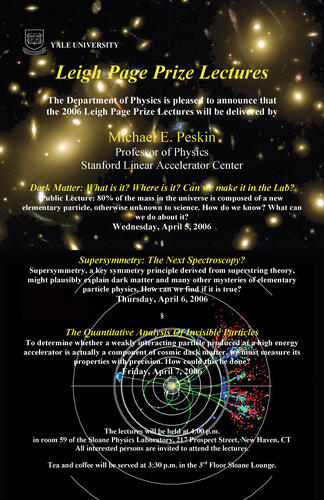
The Yale Physics 2006 Leigh Page Prize Lectures were given April 5-7, 2006 by Michael E. Peskin, Professor of Physics at the Stanford Linear Accelerator Center.
Wednesday, April 5, 2006 - Dark Matter: What is it? Where is it? Can we make it in the Lab?
80% of the mass in the universe is composed of a new elementary particle, otherwise unknown to science. How do we know? What can we do about it? [Public Lecture]
Thursday, April 6, 2006 - Supersymmetry: The Next Spectroscopy?
Supersymmetry, a key symmetry principle derived from superstring theory, might plausibly explain dark matter and many other mysteries of elementary particle physics. How can we find if it is true?
Friday, April 7, 2006 - The Quantitative Analysis Of Invisible Particles
To determine whether a weakly interacting particle produced at a high energy accelerator is actually a component of cosmic dark matter, we must measure its properties with precision. How could this be done?
The Leigh Page Prize Lecture series are given each year by a distinguished physicist in honor of Leigh Page who received his PhD in Physics from Yale in 1913. He was later acting Chair and Director of the Sloane Physics Laboratory. Professor Page devoted his time to teaching (mostly graduate classes), research, and writing several textbooks. Since 1967, several speakers in the Leigh Page Prize Lecture series have later received Nobel Prizes and other notable awards. In connection with the lecture series, a prize is offered to first year graduate students in recognition of their fine academic record and for the promise of important contributions to the field of physics.